成人零基础_英语常用9种时态
英语中的16种时态(全)

英语中的16种时态(全)动词16个时态一、一般现在时1.概念:表示经常发生的情况;有规律出现的情况;总是发生的;和事实真理。
2.时间状语:Always, usually, often, sometimes, every week (day, year, month…),once a week(day, year, month…),on Sundays(on Mondays …),3.基本结构:动词原形(如主语为第三人称单数,动词上要改为第三人称单数形式)4.否定形式:主语 + am/is/are + no t + 其他;此时态的谓语动词若为行为动词,则在其前加don't,如主语为第三人称单数,则用doesn't,同时还原行为动词。
5.一般疑问句:把be动词放于句首;用助动词do提问,如主语为第三人称单数,则用does,同时,还原行为动词。
6.例句:It seldom snows here.这里很少下雪。
He is always ready to help others.他总是乐于帮助别人。
Action speaks louder than words.事实胜于雄辩。
二、一般过去时1.概念:过去某个时间里发生的动作或状态;过去习惯性、经常性的动作、行为。
2.时间状语:ago, yesterday, the day before yesterday, last week, last(year, night, month…),in 1989,just now, at the age of 5,one day, long long ago, once upon a time, etc.3.基本结构:主语 + 动词的过去式或be的过去式+名词4.否定形式:主语 + was/were + not + 其他;在行为动词前加didn't,同时还原行为动词。
5.一般疑问句:was或were放于句首;用助动词do的过去式did提问,同时还原行为动词。
成人高考专升本英语语法
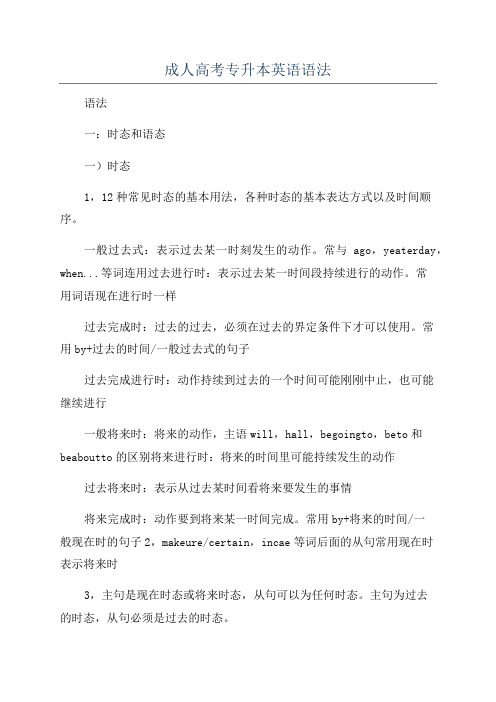
成人高考专升本英语语法语法一:时态和语态一)时态1,12种常见时态的基本用法,各种时态的基本表达方式以及时间顺序。
一般过去式:表示过去某一时刻发生的动作。
常与ago,yeaterday,when...等词连用过去进行时:表示过去某一时间段持续进行的动作。
常用词语现在进行时一样过去完成时:过去的过去,必须在过去的界定条件下才可以使用。
常用by+过去的时间/一般过去式的句子过去完成进行时:动作持续到过去的一个时间可能刚刚中止,也可能继续进行一般将来时:将来的动作,主语will,hall,begoingto,beto和beaboutto的区别将来进行时:将来的时间里可能持续发生的动作过去将来时:表示从过去某时间看将来要发生的事情将来完成时:动作要到将来某一时间完成。
常用by+将来的时间/一般现在时的句子2,makeure/certain,incae等词后面的从句常用现在时表示将来时3,主句是现在时态或将来时态,从句可以为任何时态。
主句为过去的时态,从句必须是过去的时态。
二)被动语态1,不能用被动语态的情况:A:不及物动词B:表示状态而不是动作的词,如cot,fit,lack,want,wihuit等2,感官动词(hear,feel,litento,ee,watch,notice等),使役动词:have,make,help,let等。
被动时,需要将to补上。
3,被动语态一般都与其他考点综合考察,当看到选项有被动选项时,首先应该考虑是否具有被动关系。
二,非谓语动词一)动词不定式1,动词不定式短语作主语时,往往放在谓语动词的后面,用引导词it作形式主语。
如果不定式作宾语而又跟有补语,这时,通常要用"it"作形式宾语,而将不定式放到补语后面去。
2,动词不定式的逻辑主语:1)iti+adj+forb.常用于表示事物的特征特点,表示客观形式的形容词,如eay,hard,difficult,intereting,impoible等:2)iti+adj+ofb.的句型一般表示人物的性格,品德,表示主观感情或态度的形容词,如good,kind,nice,clever,foolih,right等。
英语九大时态
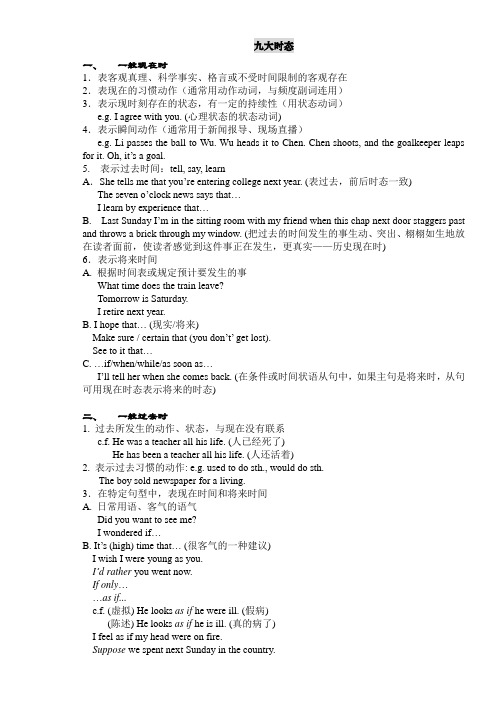
九大时态一、一般现在时1.表客观真理、科学事实、格言或不受时间限制的客观存在2.表现在的习惯动作(通常用动作动词,与频度副词连用)3.表示现时刻存在的状态,有一定的持续性(用状态动词)e.g. I agree with you. (心理状态的状态动词)4.表示瞬间动作(通常用于新闻报导、现场直播)e.g. Li passes the ball to Wu. Wu heads it to Chen. Chen shoots, and the goalkeeper leaps for it. Oh, it’s a goal.5. 表示过去时间:tell, say, learnA.She tells me that you’re entering college next year. (表过去,前后时态一致) The seven o’clock news says that…I learn by experience that…B. Last Sunday I’m in the sitting room with my friend when this chap next door staggers past and throws a brick through my window. (把过去的时间发生的事生动、突出、栩栩如生地放在读者面前,使读者感觉到这件事正在发生,更真实——历史现在时)6.表示将来时间A. 根据时间表或规定预计要发生的事What time does the train leave?Tomorrow is Saturday.I retire next year.B. I hope that… (现实/将来)Make sure / certain that (you don’t’ get lost).See to it that…C. …if/when/while/as soon as…I’ll tell her when she comes back. (在条件或时间状语从句中,如果主句是将来时,从句可用现在时态表示将来的时态)二、一般过去时1. 过去所发生的动作、状态,与现在没有联系c.f. He was a teacher all his life. (人已经死了)He has been a teacher all his life. (人还活着)2. 表示过去习惯的动作: e.g. used to do sth., would do sth.The boy sold newspaper for a living.3.在特定句型中,表现在时间和将来时间A. 日常用语、客气的语气Did you want to see me?I wondered if…B. It’s (high) time that… (很客气的一种建议)I wish I were young as you.I’d rather you went now.If only……as if...c.f. (虚拟) He looks as if he were ill. (假病)(陈述) He looks as if he is ill. (真的病了)I feel as if my head were on fire.Suppose we spent next Sunday in the country.三、一般将来时(一)表示一般将来时的动词形式及用法1.用情态助动词shall/will + 动词原形表示A.表示“预见”——时间B.表示“意图(愿)”,没有将来的意思,有个人感情成分No, I won’t lend it to you.Exception: I’ll give him some advice if he’ll listen to me. (表意愿)为了表纯粹的将来时间,用“will be doing”I will be writing to you soon.2.用“be going to do sth.”表示A. 表示“预见”——有迹象表明,将来某个时刻,将发生某事Be careful! The pile of boxes is going to fall.B. 表示“意图”——经过考虑的,打算在近期做的I’m going to Beijing.How long are you going to stay here?3.用“be doing”表示——按即或安排将发生的动作The plane is taking off at twelve.特点:a. 用时间状语以区别于现在进行时b. 意思靠上下文来理解:Hurry up! The train is starting.4.用“be to do sth.”A. 表示按计划安排We are to learn Chapter Six next week.B. 报纸或电视台宣布官方正规的消息Premier Li is to visit Japan next week.The highway is to open to traffic next Sunday.C.表命令、禁止,没有将来的意思You are to stay here!No one is to leave the classroom without my permission.5.用一般现在时的动词形式表示将来时间(二)各种表示一般将来时的动词形式的用法比较1.Will/shall + 动词原形和be going to结构的比较A. 都表示意图,可互换B.预先经过考虑的,用“be going to”She has bought some cloth. She is going to make herself a dress.C.事先没有考虑的,用“will”表意愿I will go. I will help you.2.be + V.-ing和be going to结构的比较A.表将来,现在已觉得做时,两者可互换B.be + V.-ing: 肯定,不容改变的安排,比较正式be going to:有迹象表面将发生某事3.will/shall+动词原形和将来时表示将来时间的比较If you will (will表意愿,不能略写) kindly wait for a moment, I’ll ask the manager to speak to you.四、现在进行时(一) 用法1.表示说话时正在进行的动作2.表示现阶段正在进行的动作(讲话时不一定在做)(暂时性)3.表计划安排中近期将发生的动作(有时间状语)4.表示刚过去的动作:talk, tell, say5.表示婉转的语气:I’m hoping/wanting/wondering if… (在口语中)6.与always等频度副词连用,表示感情色彩的现阶段发生的动作He’s always finding our faults. (表厌烦)He’s always borrowing money from me and forgetting to pay it back.(二)一般现在时与现在进行时的用法比较1.相对而言,一般现在时表示经常性动作,现在进行时表示暂时性动作I live in Guangzhou. (长期)She’s living in Guangzhou. (读书期间,暂时)2.在报道中,一般现在时表示短暂动作,现在进行时表示持续动作He shoots, and it’s a goal. The crowd is cheering and the other players are running to him to…The bus stops. (一下子停下)The bus is stopping. (慢慢停下)3.一般现在时用来叙述事实,现在进行时含有某种感情色彩(不加频率副词时有赞扬的语气)You are doing fine in school.五、过去进行时1.表示过去某一时间正在进行的动作2.表示过去某段时间的暂时性动作At that time I was teaching in Shaoguang.3.表示按计划安排过去某时将发生的动作(有时间状语)He was leaving a few days later. (表示过去将来时)4.表示婉转口气:want, hope, wonderI was wondering if…5.在某些结构中做想象的用法,表示对现在或将来的设想(虚拟语气)I wish he weren’t speaking so loudly. (与现在事实相反)If they were leaving tonight, I’d like to go with them. (与将来事实相反)6.与频度状语连用,表示感情色彩He was always changing his mind.7.作为铺叙故事情节的背景A man was ferrying across the river when his sword fell into the river.六、现在完成时:have/has + 过去分词(一)不能用的情况:有瞬间动词,有具体的过去时间状语(二)用法1.过去某时发生的动作,其结果和影响现在依然存在I’ve traveled by plane. (有此经历,不确切的过去时间)Do you understand what I have said? (动作的先后)与时间状语连用的情况:A.可以与不确切的过去时间状语连用:already, yet, before, recently, lately..B.可以与频度状语连用:sometimes, ever, never, once, often…C.可以与包括现在时间在内的时间状语连用:this month/morning…,但暗示着另外一个问题The rain has stopped now (=at last).2.(现在)未完成用法:过去发生的动作持续到现在,也许还会持续下去A.与since引导的时间状语连用:since + 名词词组/从句I’ve been here since last July.She has taught us since I came to this school.B.由for引导的时间状语,表一段时间C.可以和其他表示包括现在时间在内的一段时间的时间状语连用:until now, in the past few years, all morning…七、现在完成进行时:have/has + been + V.-ing(一)用法1.表示某一动作从过去某个时刻开始,一直延续到讲话这个时候还在进行2.表示某一动作从过去某个时刻开始,一直延续到讲话这个时候刚刚结束——Sorry I’ve kept you waiting.——That’s all right. I’ve been reading newspapers.(二)现在完成时与现在完成进行时的用法比较1.意义一致,可互用(有时间状语时)2.句子里没有时间状语时:How long have you learned English? (已完成)How long have you been learning English? (未完成)八、过去完成时:had + 过去分词1.表示一个动作或状态在过去某一时间或某一动作之前已经发生(过去的过去)He flew home, but his father had died.2.表示一个动作或状态在过去某一时间之前已经开始,一直延续到这一过去时间还没结束(用段时间的时间状语)By six o’clock, they had worked for 24 hours.She said she had made great progress since she came here.3.想象性用法(虚拟语气)I wish I had gone with you yesterday.4.表示过去未曾实现的希望、愿望、打算:hope, want, think, expect, intend, suppose…We had hoped you would (be able to) go with us.We had wanted to help but couldn’t get there in time.九、过去完成进行时: had been + V.-ing1.表示一个动作从过去某一时间开始,一直延续到另一过去时刻,在那时刻,该动作可能刚结束,也可能还在继续I was tired yesterday when you saw me because I had been playing for 3 hours /since twoo’clock.When I got to the meeting, the speaker had been speaking for an hour.2.通常用于间接引语中。
成人零基础英语常用9种时态
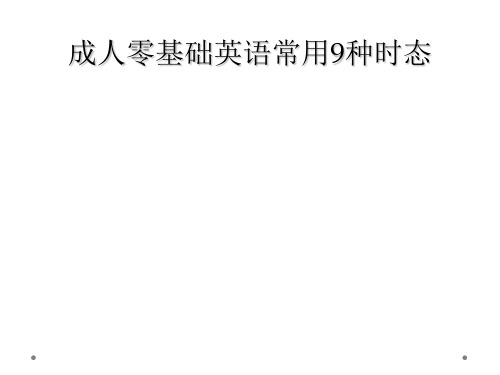
4.现在进展时 be〔am/is/are〕+现在分词
1表示说话此刻或现阶段正在进展的行为 〔时间特征:now, at the moment;动作提示: look〕
We are waiting for you now. Look, they are swimming. we are eating breakfast now. John is watching the baseball game on TV now . 2现阶段的行为——表示长期的动作,说话时动 3作表未示最必近正的在未来进即展将。发生〔动时作间。C特om征e:gtohistatertrmlea,vtehaerrsivee IMdH’ayemybisolse〕yaafvrliinwnegadfyoissr cKcoeomnmtiningpgtltoaoimsneoeinrmrogew. .t抱his怨afternoon.
2〕表示在过去一段时间内,经常性或习惯性的动作。 When I was a child, I often played football in the street.
3〕wish, wonder, think, hope 等用过去时,作试探性的 询问、请求、建议等。 I thought you might have some.
in two days, tomorrow evening By this time tomorrow, I'll be lying on the beach.
7现在完成时 Have/ has +过去分词P.P
1.表示动作已经完成,强调过去发生的某一动作对现在造成的 影响和结果。常与一些时间状语连用:already; this time; ever; recently till now 等。
成人英语培训 时态 --一般现在时

They do not (don’t) play football in the playground. Do they play football in the playground? Yes, they do. No, they don’t.
写出下列动词的第三人称单数形式
s s s , sing s , swim , paint , cook , run write s , dive s, jump s, draw , s s s read s, ride s , play , feed , walk , pick ,sclimb , s throw s , leave , s s , dig ,sshake s, chase s, talk , put s s , read , eat s , do s, wash , watch es s sailes, collect es s go s es dry dries fly flies
一般疑问句: Am/Is/Are+主语+其它成分? e.g. Is it a tall tree? Do +主语(不是第三人称单数) +动词原形+其它成分? e.g. Do the Greens often go swimming in summer? Does+主语(是第三人称单数)+动词原形+其它成分? e.g. Does the earth go around the sun ?
天津昌昊实业有限公司
成人基础英语培训 之时态
26th.Mar.2016
• • • • • • • • • • • • • •
Where do you come from? I come from Greece. What's the climate like in your country? It's very pleasant. What's the weather like in spring? It's often windy in March. It's always warm in April and May, but it rains sometimes. What's it like in summer? It's always hot in June, July and August.The sun shines every day. Is it cold or warm in autumn? It's always warm in September and October. It's often cold in Nove mber and it rains sometimes. Is it very cold in winter? It's often cold in December, January and February. It snows sometimes.
成人学位英语语法汇总

第一节动词的时态一、一般现在时:1、由when、as soon as、the minute、the moment、till、until等引起的时间状语从句,以及由if、unless、provided that等引起的条件状语从句常常用一般现在时态表示将来的动作,而主句则用一般将来时态.例:They will go home for winter vocation as soon as they finish their exams.2、当表示普遍的真理或者众所周知的客观事实,常常用一般现在时态.例:Theearth is round.地球是圆的.二、一般过去时:区分三个短语的用法:1、used to do sth:过去常常做某事.2、be/get used to doing sth:习惯做某事.3、be used to do sth:被用于做某事.三、一般将来时:1、be to+动词原形:表示安排或计划好了的动作.例:The Third-Ring Road isto be open to traffic before National Day.2、be about to+动词原形:表示即将发生的动作.例:The lecture is about tobegin.讲座即将开始.3、一些表示动作趋势,如开始、终结,以及一些表示动作方向,如往来的动词,常常用现在进行时态表示按照安排将于将来发生的事情,这类动词常见的有如:start, go, leave, come, arrive等.例:We are leaving for Beijing tomorrow.我们明天动身去北京.四、进行时态:重点区分when和while引起的时间状语的用法.When表示时间上的点,在考试中其引导的时间状语从句多翻译为“这时…”,主句多用进行时态;while引导的时间状语从句多翻译为“正当…时”,该从句用进行时态.例:One of the guards was sleeping when the general came in, which made him very angry.I fell and hurt myself while I was playing tennis.五、现在完成时:重点区分havehasbeen to:某人去过某地,表示一种经历,强调状态,可以和once, twice, often, never, ever连用;Havehas gone to:某人在去某地的途中或已在某地,强调动作.此句型不能与上述时间状语连用.例:He has gone to America.他已经去了美国.He has been to America twice.他去过美国两次.六、过去完成时:1、强调一个动作发生在另外一个过去的动作之前时,用过去完成时.2、It was the first/second/last time that…,在该句型,that从句用过去完成时态.七、将来完成时:常常标志性地由by、by the time、by the end of引起一个表示将来时间段的时间状语,主句用将来完成时态.第二节感官动词、使役动词的用法及英语中常考的两个句式结构一、感官动词的用法及其被动语态:在英语中,常见的感官动词有“五看二听一感觉”see、watch、look、notice、observe;hear、listen to;feel,在主动语态中用动词原形或现在分词作宾补,如see sb do/doing sth,改为被动语态时则要加to,如sb be seen to do sth.二、使役动词的用法及其被动语态:在英语中,常见的使役动词有make、let、have,在主动语态中用动词原形做宾补,如make sb do sth,改为被动语态时则要加to,如sb be made to do sth, 两种形式都表示使/让某人做某事的意思.例:We were made to study hardy.我们被要求努力学习.三、英语中常考的句式结构一:sth need/ want/ require doing 某物需要…=sthneed/want/require to be done此句式主语为物例:My room is a mess. It needs tidying up整理.四、英语中常考的句式结构二:have/get sth done 请/让别人做某事have/get后接宾语为物例:I have taken many photos. I’m going to get the film developed.五、情态动词的被动语态,其构成为:情态动词+be+过去动词.例:The work must befinished before lunch. 这项工作必须在午饭前干完.第三节情态动词常见的情态动词有can、could;may、might;must、need;should;ought to,对于情态动词常考其两方面的内容,一是情态动词用于推测句型,二是情态动词用于虚拟语气该部分的讲解放在虚拟语气一、情态动词用于对现在内容推测的常见句型有:1、Can/may do sth:表示对现在内容的可能性的推测;2、Must do sth:表示对现在内容的肯定性的推测.二、情态动词用于对过去内容推荐的常见句型:1、can/may have done sth:表示对过去内容的可能性;2、must have done sth:表示对过去内容的肯定性的推测.例:1、Mr Green must have failed to receive my letter, otherwise he would have replied.2/ I believe he must have had an accident, otherwise he would have arrived on time.第四节虚拟语气虚拟语气表示与客观事实相反的假设,由if虚拟条件从句和主句构成.一、虚拟语气的基本内容根据虚拟与其这种与事实相反的假设所对应的时间不同,虚拟语气的if虚拟条件从句与主句的谓语动词分别有三类构成形式:例:1、I wouldn’t talk that way if I were Peter.2、If the whole operation had not been planned before hand, a great dealof time and money would have been lost3、Jean doesn’t want to work right away because she thinks that if shewere to get a job she probably wouldn’t be able to see her friends very often.4、I would ask George to lend us the money if I knew him.5、Do you think there would be less conflict战斗、斗争 in the world ifall people spoke the same language.6、If Bob had come with us,he would have had a good time.二、if的省略形式又称虚拟语气的倒装结构在if虚拟条件从句中,如果谓语部分包含were,should,had等词,则可以把这些词放到主语前,省略if,构成虚拟语气的倒装结构.三、主句与从句时间不一致时虚拟语气的构成当虚拟语气的if虚拟条件从句和主句的动作发生的时间不一致时,要根据各自表示的时间采用对应的虚拟语气的构成形式.例:1、If I had attended the meeting yesterday, I would know what happened now.2、If you had taken our advice at that time, you would not be in trouble now.四、主观倾向性动词引导的虚拟语气的构成在英语中存在一些动词,表示建议、命令、要求等主观的倾向,由这些动词引导的that宾语从句中,从句的谓语动词要用should+动词原形,should可以省略.这类常见的主观倾向性动词有“一坚持、二命令、三建议、五要求”,分别是:一坚持:insist 二命令:order、command 三建议:suggest、advisen advice、propose提议、建议五要求:ask、demand、require、request、desire例:1、The doctor advised that Mr. Malan have an operation right away so as to save his life.2、His mother insisted that he put on the coat when going out.同时,如果在题干中出现上面这些主观倾向性动词的名词和形容词形式,题干中从句部分的谓语动词也要用should+动词原形,should可以省略.考试中常见的词汇有:order,command,suggestion,advice,proposal,demand,request,desire,advis able,desirable.五、wish that…和if only引导的虚拟语气的构成Wish that引导的宾语从句和if only引起的感叹句都用虚拟语气来表示一种没有实现或无法实现的愿望,其中wish that句型往往翻译为:多么希望 (i)only表示的愿望较wish that更强烈,常翻译为但愿;要是…就好了.两者的用法基本相同.两者的用法是:1、当表示与现在的事实相反的一种愿望时,wish that引导的宾语从句和ifonly引起的感叹句中谓语动词采用的形式是:did/were;2、当表示与过去的事实相反的一种愿望时,wish that引导的宾语从句和ifonly引起的感叹句中谓语动词采用的形式是:had done;3、当表示未来一时很难实现的一种愿望时,wish that引导的宾语从句和ifonly引起的感叹句中谓语动词采用的形式是:would do.六、would rather引导的虚拟语气的构成Would rather的意思是“宁愿、宁可”其引导的宾语从句一般省去that通常用虚拟语气表示一种与事实相反的假设.我们可以假设A、B是两个人,通过牢记一下句式来记住其用法:1、A would rather B did sth:表示与现在或将来事实相反的一种假设.2、A would rather B had done sth:表示与过去事实相反的一种假设七、It is high time that…句型中虚拟语气的构成It is high time that…句型表示“早该是…的时候了”,在that从句中,谓语动词一般用did例:1、It’s high time we did something to stop traffic accident.2、Don’t you think it is time you gave up smoking八、in case、lest、for fear that引导的从句中虚拟语气的构成in case、lest、for fear that引导的目的状语从句,表示忧虑或担心,翻译为“以防万一…”,从句的谓语动词要用should+动词原形,should可以省略.例:1、Written applications should be sent to us in case there be some problems with the electric version.2、I wrote it down in case I should forget it.九、含蓄虚拟语气的构成虚拟条件句有时不是通过if虚拟条件从句明显地表达出来,而是隐含在副词、介词短语或上下文中,这种情况称作含蓄虚拟语气.经常标志性地用于含虚拟语气的介词、副词有:without要是没有,but for要不是,otherwise否则,要不然.只要见到这几个词,所要选择的虚拟语气的构成多用would have done形式.例:1、Without your help, we would not have achieved so much.2、But for the rain, we would have had a nice holiday.十、as if,as though引导的虚拟语气的构成As if,as though翻译为“好像”,谈论的往往是不可能或不真实的情况,他们所引导的状语从句要用虚拟语气,谓语动词采用的形式和wish that句型中谓语动词采用的形式相同.十一、it is+形容词+that引导的从句中虚拟语气的构成在it is+形容词+that引导的从句中,如果该形容词表示“重要的、必须的、强制的”、者“惊奇的、令人不满的”,that从句中的谓语动词要用should+动词原形,should可以省略.1、用于表示“重要的、必须的、强制的”的形容词常见的有:important、vital极重要的、critical决定性的、crucial决定性的、necessary、essential必不可少的、urgent、compulsory,obligatory必须的,imperative必要的、紧急的2、用于表示“惊奇的、令人不满的”的形容词常见的有:strange、surprising、amazing,unthinkable、odd奇怪的、incredible不可信的,不能相信的、ridiculous.十二、虚拟与不虚拟的错综混合一句话中,句子的一部分采用虚拟语气的构成形式,另一部分则采用与事实相对应的某一种时态,这样就形成了虚拟与不虚拟的错综混合的现象.在这种情况下,最为常见的一个词是but,一般情况下在虚拟与不虚拟相混合的句子中,由but引起的句子选择与事实相对应的某一种时态,而不采用虚拟语气的构成形式.例:I would have come earlier, but I didn’t know you were waiting.我本来可以早些到,但我不知道你在等我.十三、情态动词用于虚拟语气记住以下句式及其含义:1、should/ought to have done sth本来应该做某事而未做2、should not have done sth / ought not to have done sth 本来不应该做某事而做了3、need have done sth:本来需要做某事而未做4、need not have done sth 本来不需要做某事而做了5、could have done sth 本来能够做某事而未做6、could not have done sth 本来不能够做某事而做了7、might have done sth 本来可以做某事而未做8、might not have done sth 本来不可以做某事而做了第五节非谓语动词一、动词不定式动词不定时的基本结构和用法1、动词不定式的基本结构及其否定式2、动词不定式的语法功能动词不定式是一种非谓语动词形式,由不定式符号to加动词原形构成.在句子中可以充当主语、宾语、表语、定语、状语和补足语.例:1Good-bye, Mr. Wang. I’m pleased to meet you.2 Encouragement through praise is the most effective method ofgetting people to do their best.3、动词不定式的被动式当不定式的逻辑主语一般情况下是动词不定式前面的名词是不定式所表示的动作的对象或动作的承受者时,不定式一般要用被动式.例:1Mr. and Mrs. Smith didn’t expect the house to be decorated so well.2The ability to be clearly heard is very important for any speaker.4、动词不定式的完成式当不定式所表示的动作发生在主句谓语所表示的动作之前时,用动词不定时的完成式.例:1Judging from his manner at the party, he doesn’t seem to have received much education.2The book is said to have been translated into several languages up to now.5、动词不定式的复合结构如果需要指出不定式所表示的动作的发出者即逻辑主语时,要再不定式前用for加名词或代词表示.例:1It was very difficult for me to learn Spanish.2It is necessary for you to hand in the papers immediately. 6、同一动词接不定式和动名词的区别英语中有些动词既可以接动词不定式,又可以后接动名词,但是两种形式所表达的意思却是截然不同的.考试中常见的形式有:Stop to do:停下来去做另外一件事情 stop doing:停下正在做的事情Go on to do:继续去做另外一件事情 go on doing:继续做正在做的事情Try to do:尽力去做某事 try doing:尝试去做某事Mean to do:打算做某事 mean doing意味着某事Remember to do:记得要去做事情 remember doing:记得曾经做过某事Forget to do:忘记要去做某事 forget doing 忘记曾经做过某事Regret to do:不得不去做某事 regret doing 后悔曾经做过某事例:1、The old man walked slowly, stopping frequently to rest.2、Men will never stop searching for new ways of getting new energy.3、You have been talking for two hours. How long do you intend to goon talking like that4、Don’t forget to close the window before leaving the room.二、动名词动名词即动词ing形式,在句子中可以充当主语、宾语、表语和定语.1、动名词的基本形式例:1、Arriving for the lecture early is better than taking the chance of being late.2、At school Li Ming ran into many problems, such as choosing classesand handling his time.3、Finding answers to these questions is something like a detectivestory.2、英语中后接动名词的常见动词有:Admit、appreciate、avoid避免、consider、delay、deny否认、拒绝、enjoy、escape、finish、imagine、miss、practice、risk、suggest等.例:We shall appreciate hearing from you soon.3、英语中接动名词的常见词组有:Be accustomed to doing惯常的,习惯于、be used to doing过去习惯,devote to doing把…奉献、专用、feel like doing、look forward to doing、object反感 to doing、can’t help doing、have trouble indoing、have difficulty doing、have a hard timedoing等.4、英语中后接动名词的常见形容词有:Be busy doing,be worth doing等.5、英语中后接动名词的常见名词有:There is no use doing、there is no point意义doing、there is no gooddoing、 there is no need doing6、动名词的否定式动名词的否定式是在动名词前面直接加not.例:John suggested not saying anything about it until they found out more facts.7、动名词的逻辑主语当动名词的逻辑主语是代词时可使用形容词性的物主代词.例:1、He forgot about my asking him to attend my wife’s birthday party.2、I object to his making private calls on the office phone.我反对他用办公室的电话打私人电话8、动名词的完成时当动名词表示的动作发生在主句谓语所表示的动作之前时,用动名词的完成时.例:1、I don’t remember having ever said that.2、I regret having done such a thing. 我后悔做了这样的事.9、动名词的被动式例:1、No one avoid being influenced by advertisements.2、Susan was very unhappy for not having been invited to the party.三、分词1、现在分词的具体形式:过去分词的形式:done2、现在分词和过去分词的区别以及分词在句子中的语法功能1、现在分词与过去分词的区别主要体现在语态和时态上.在语态上,现在分词表示主动的意思,即现在分词与句子的主语在逻辑上是主动关系现在分词表示的动作是句子的主语发出来的;过去分词表示被动的意思,即过去分词与句子的主语在逻辑上是被动的关系句子的主语是过去分词表示的动作的承受者,或者可以说过去分词表示的动作所针对的对象是句子的主语;在时间上,现在分词表示动作正在进行,过去分词则表示动作已经完成.简而言之,现在分词表主动、表进行;过去分词表被动、表完成.这一原则要牢记.2、分词在句中的语法功能:分词在句子中可以做状语、补足语、表语和定语.其中分词作状语的用法最为常考.3、分词的否定式实在分词的前面加not.例:1、Seeing on the top of hill, we find that the village seems very small.现在分词表主动做伴随状语.2、Seen from the top of hill, the village seems very small.过去分词表被动做伴随状语.3、She was sitting in an armchair reading a book. 现在分词表主动做伴随状语.4、Damaged in the war, the bridge needs repairing now.过去分词表被动做伴随状语.5、Not knowing anything about the accident, he went to work aswell.现在分词的否定式表主动做原因状语.6、We kept our fire burning all night to frighten the wolves.现在分词做宾补表示动作正在进行.4、两个经常考查的用过去分词形式做状语的词是convince和compare.例:They all returned to the village convinced that the dangerwas over.5、现在分词和过去分词转化的形容词的区别:在语法功能上,他们都可以做定语和表语,但是以ed形式结尾的形容词修饰人,以ing形式结尾的形容词修饰物.例:1、She told me that it was the most delighting gift herdaughter had received.2、My parents are pleased with my progress.6、现在分词的被动式和过去分词的区别:现在分词的被动式being done表示在进行着的被动,过去分词done表示完成了的被动.例:1、The interviewer should take down notes at the moment theperson being interviewed answers the questions.2、Standing on the bank, the children watched the ship beingloaded with all kinds of goods.现在分词的被动式3、We found the eggs eaten by the snake. 我们发现鸡蛋被蛇吃了.过去分词表示动作的完成和结果3、分词与句子主语在逻辑关系上的一致性现在分词表主动,过去分词表被动,分词与句子主语的逻辑关系常常是三级英语出题的知识点.例:1、Feeling tired after a hard work, she fell into bed and went straight to sleep.2、Arriving at the bus stop, he found a lot of people waiting there.4、分词的独立主格结构当句子前后两部分的主语指代事物不一致简称主语前后不一致,又需要其中一个部分作状语时,往往把该部分形成名词/代词+分词n./pron.+doing/done的形式,这种形式被称作分词的独立主格结构.在这种结构内部,当名词/代词与分词是逻辑上的主动关系时,用现在分词;当名词/代词是逻辑上的被动关系时,用过去分词.独立主格结构常做原因状语或伴随状语,是考试重点.例:1、The plane crashed, its bombs exploding as it hit the ground.2、Weather permitting, we’ll go to the Summer Palace.5、with结构作状语With结构做状语,其构成是:with+名词+现在分词/过去分词/动词不定式/形容词/介词结构,由于经常考查with+名词+现在分词/过去分词这种形式,所以放在这里讲解,并且要明确何时用with+名词+现在分词结构,何时用with+名词+过去分词结构;如果分词与with后面的名词是主动关系,用现在分词;如果分词与with后面的名词是被动关系,则用过去分词.例:1、He walked across the meeting room with everyone looking at her.2、With the old man leading the way, we had no trouble in findingthat mysterious cave.3、With the novel published, the writer becomes a famous person.4、With the matter to be discussed at the meeting tomorrow, we leavethe company.5、With the price so high, they still determine to buy the car.6、With the book in the hand, the teacher came in the classroom. 第六节各种从句一、名词性从句包括主语从句、宾语从句和表语从句.如果一个句子在一句话中充当主语、宾语、或者表语,那么该句子就被称作主语从句、宾语从句或者表语从句.名词性从句是三级英语考试的重点,我们应该明确以下几个方面的内容:1、主语从句、宾语从句和表语从句都用陈述语序,二不用疑问语序.2、应对主语从句、宾语从句和表语从句的题型,我们要牢记整体性原则,即首先要保证从句的完整性,一般要添加适当的连接代词、连接副词或者从属连词使从句完整,然后才能在主句中充当主语、宾语或者表语.3、考试中常见的从属连词、连接代词、连接副词有:从属连词:that只起连接句子的作用,不具任何意义,if,whether;连接代词:what,whatever,who,whoever,whom,whomever,whose;连接副词:when, where, how, why例:1、Who let out the news remained unknown.It remained unknownwho let out the news. 谁泄露了那个消息仍旧无人知道.2、When we’ll start is not clear.It is not clear when we’llstart.我们何时出发还不清楚.3、What I saw two men crossing the street.4、What the press reported was not the way the event happened5、I do n’t doubt that he is telling the truth.6、Can you tell me what it is about the city that makes peoplelove it so much7、The people at the party were worried about Janet because noone was aware of where.8、He was a man of fine character in all points except that hewas rather.9、The reason I don’t go there was that I got a new job.10、This is what he wants.这就是他想要的东西.11、The question is whether we can finish our work by tomorrowmorning.4、在下列情况下不能用if,而用whether1、后面直接跟or not:I wonder whether I’ll catch the last busor not.我不知道我能否赶上末班车2、引导主语从句:Whether they win or lose is all the same to me.我们胜利也好,失败也好,对我来说都是一样的.3、后跟不定式:He didn’t tell me whether to go or stay.他没有告诉我是走还是留下.4、前面有介词:He raised the question of whether we could findthe necessary money.他提出我们能否筹集到必要的资金这个问题.二、定语从句在复合句中起定语作用的从句叫作定语从句,被修饰或者限定的那个次叫作先行词.定语从句分为两种:限定性定语从句和非限定性定语从句——紧跟在先行词后面,不用逗号和先行词分开的定语从句叫作限定性定语从句;而用逗号和先行词分开的定语从句叫作非限定性定语从句.1、引导定语从句ude关联词包括:关系代词:that、which、whose、who、whom、as;关系副词:when、where、why关系代词和关系副词在定语从句中都充当一定的成分.2、which指物,who或者whom指人,whose表示所属关系,这些关系代词既可用于限定性定语从句,又可用于非限定性定语从句;that既可以指人,又可以指物,但是只能用于限定性定语从句.例:1、The company official who I thought would be fired receiveda raise.2、The investigation, whose results will soon be published,was made by john.3、An old friend from abroad, whom I was expecting to stay with,telephone me from the airport.4、I don’t like the way that/in which you speak.3、关系副词when,where,why引导的定语从句:如果先行词是表示时间的名词,一般用when,如果先行词是表示地点的名词,一般用where,但是也应注意例外的情况;如先行词是reason,则用why.关系副词相当于介词加关系代词.例:1、The time will come when man can fly to outer space freely.2、I will never forget the ten years which we both spent inthe little village.3、I’ll never forget the village where in which I spent mychildhood.4、I’ll never forget the village which I visited last year.5、I don’t know the reason why for which he did that.4、先行词也可以是整个句子,这时定语从句一般用which或as来引导,修饰整个句子的内容.Which一般只能置于句中或句末,而as的位置比较灵活.例:1、He has made another wonderful discovery, which I thinkis of great importance to science.2、He was awarded a gold medal, which his whole familyconsidered a great honor.3、As we all know, the earth is round.5、“名词代词+of+which/whom”意思上等于whose+名词,表示所属关系,一般出现在非限定性定语从句.例:1、We’ve tested three hundred types of boot, none of whichis completely water proof2、The United States is composed of fifty states, two of whichare separated from the others by land or water.6、当先行词由the same或such修饰时,关系代词用as指代前面作为先行词的人或物,形成“the same…as”,“such…as”结构.例:It wasn’t such a good dinner as she had promised us.7、当先行词由形容词的最高级、序数词或the only/next/very等修饰时,关系代词用that而不用which.例:1、This is the most interesting film that has been shown inthis theater.2、This is the very bike that I am looking for.8、当先行词是不定代词all,anything,nothing,everything,something等时,关系代词用that而不用which.例:I couldn’t find anything that satisfies my needs.9、关系代词前带介词的定语从句:如果关系代词在定语从句中做了动词词组的宾语.有些动词词组所包含的介词可以提到关系代词的前面.例:Before her marriage, she spent a considerable相当的 timein that very part of shanghai to which she belonged.三、同位语从句常跟在fact,news,idea,hope,belief,thought,plan,evidence等名词的后面,由连词that引导的从句称为同位语从句,that在同位语从句中不做任何成文,这是与定语从句的区别,同位语从句对前面的名词起进一步解释的作用.例:1、Would the news that he failed to pass the exam bother you2、I had no idea that you were here.我没有想到你会在这里.四、状语从句在主从句复合句中起状语作用的从句叫状语从句.常见的状语从句有时间、地点、条件、原因、让步、方式、比较、目的、结果.一、时间状语从句常用的连词有:when,whenever无论什么时候,ever since,untilhardly…when/no sooner…than/no sooner ...than/as soonas/the moment/the minute一…就….例:1、No sooner had they got the goods covered up than itstarted raining hard.2、She has wanted to become a nurse ever since she wasa young girl.二、条件状语从句常用if,unless,as/so long as, provided that假如例:1、Unless I’m mistaken, I’ve seen that man before.2、Unless you return those books to the library immediatelyyou will have to pay a fine交罚款.三、原因状语从句需要区别because和because of:because是连词,引导原因状语从句;because of是介词,后接名词形成介宾结构作原因状语.例:1、He cannot go to school because he is ill.他因为生病不能上学.2、He cannot go to school because of his illness.四、让步状语从句1、让步状语从句表示:尽管…,或无论…,常用though/although,as尽管,even if/though, however, wherever, whatever,whomever, no matter how/where/what/who/whom等引导.Despite、in spite of尽管.例:1、In short, wherever he lives, a man belongs to somesociety.where引导让步状语,wherever=no matter where2、Whoever you are, you must show your ticket to go intothe cinema.3Even if you disagree with her, her idea is still worthconsidering.2、as引起的让步状语从句的构成是:形容词/副词/名词/分词+as+主语+谓语动词.例:1、Young as he is, he knows what is the right thingto do.2、Child as he is, he knows quite a lot about society.3、Much as he likes her, he gets annoyed打扰with hersometimes.4、Published as it was at such a time, his book stillattracted much attention.第七节主谓一致一、名词physics物理,maths数学,news,means方法,works工厂等一般被认为形式是复数形式,意思是单数的名词,它们作主语的时候动词一般用但属性是.例:1、The news coming from different parts of the world is often extremely discouraging these days.2、Every means has been trid.二、动名词、不定式、从句作主语时,谓语动词用单数.例:When and where the new hospital will be built remain a mystery.三、当主语是a number+of+复数名词时,翻译为“许多…”,谓语动词用复数;当主语是the number+of+可数或不可数名词时,翻译为“…的数目”,谓语动词用单数.例:1、The number of errors made by him was surprising.2、A number of cars are parked in front of my house.四、当主语由as well as等词修饰时的主谓一致.当句中的主语后接with,aswell as,along with,together with,including,accompanied by,but等短语+名词代词时,主语与谓语的一致关系不受影响,主语是单数名词时,谓语动词用单数形式,主语是复数形式时,谓语动词用复数形式,例:1、John, along with twenty friends, is planning a party.约翰和二十个朋友正在计划句型一个集会.。
初中英语九大时态总结
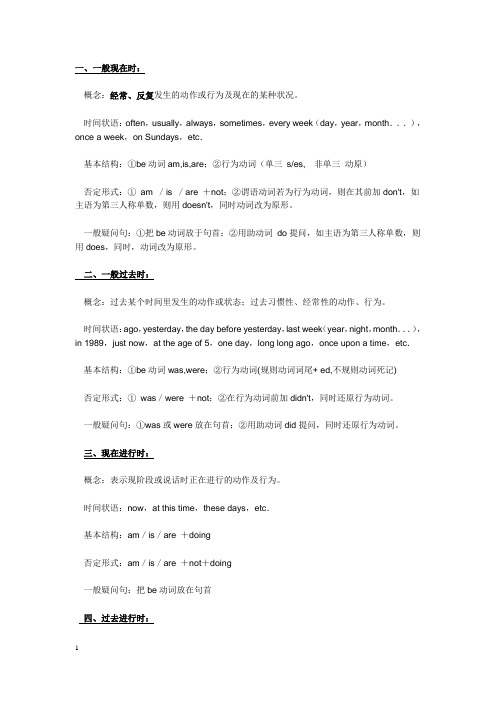
一、一般现在时:概念:经常、反复发生的动作或行为及现在的某种状况。
时间状语:often,usually,always,sometimes,every week(day,year,month...),once a week,on Sundays,etc.基本结构:①be动词am,is,are;②行为动词(单三s/es, 非单三动原)否定形式:①am /is /are +not;②谓语动词若为行为动词,则在其前加don't,如主语为第三人称单数,则用doesn't,同时动词改为原形。
一般疑问句:①把be动词放于句首;②用助动词do提问,如主语为第三人称单数,则用does,同时,动词改为原形。
二、一般过去时:概念:过去某个时间里发生的动作或状态;过去习惯性、经常性的动作、行为。
时间状语:ago,yesterday,the day before yesterday,last week(year,night,month...),in 1989,just now,at the age of 5,one day,long long ago,once upon a time,etc.基本结构:①be动词was,were;②行为动词(规则动词词尾+ ed,不规则动词死记)否定形式:①was/were +not;②在行为动词前加didn't,同时还原行为动词。
一般疑问句:①was或were放在句首;②用助动词did提问,同时还原行为动词。
三、现在进行时:概念:表示现阶段或说话时正在进行的动作及行为。
时间状语:now,at this time,these days,etc.基本结构:am/is/are +doing否定形式:am/is/are +not+doing一般疑问句:把be动词放在句首四、过去进行时:概念:表示过去某段时间或某一时刻正在发生或进行的行为或动作。
时间状语:at this time yesterday,at that time或以when引导的谓语动词是一般过去时的时间状语等。
英语八大时态一览表
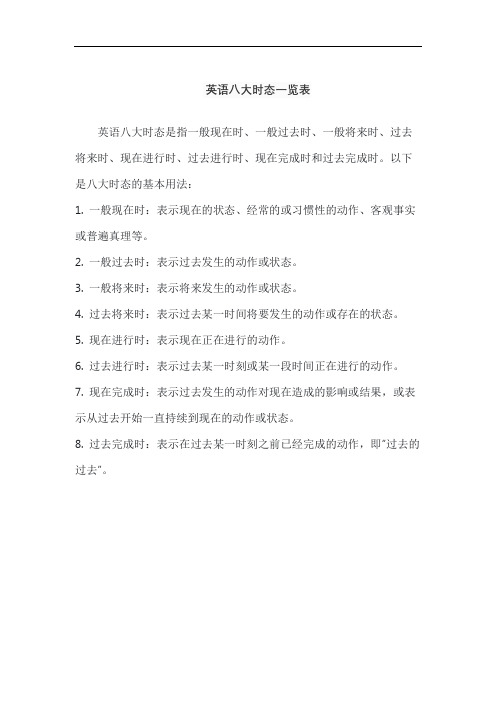
英语八大时态一览表
英语八大时态是指一般现在时、一般过去时、一般将来时、过去将来时、现在进行时、过去进行时、现在完成时和过去完成时。
以下是八大时态的基本用法:
1. 一般现在时:表示现在的状态、经常的或习惯性的动作、客观事实或普遍真理等。
2. 一般过去时:表示过去发生的动作或状态。
3. 一般将来时:表示将来发生的动作或状态。
4. 过去将来时:表示过去某一时间将要发生的动作或存在的状态。
5. 现在进行时:表示现在正在进行的动作。
6. 过去进行时:表示过去某一时刻或某一段时间正在进行的动作。
7. 现在完成时:表示过去发生的动作对现在造成的影响或结果,或表示从过去开始一直持续到现在的动作或状态。
8. 过去完成时:表示在过去某一时刻之前已经完成的动作,即“过去的过去”。
英语九大时态总结表格

英语九大时态总结表格时态概述英语中共有九种时态,它们分别是:一般现在时、一般过去时、一般将来时、现在进行时、过去进行时、将来进行时、现在完成时、过去完成时和将来完成时。
这些时态的正确使用对于表达正确的时间和语义非常重要。
以下是对每种时态的简要总结。
时态使用场景例句一般现在时表示经常性或普遍真理I go to school every day.一般过去时表示过去发生的事情She watched a movie last night.一般将来时表示将来发生的事情They will travel to France next week.现在进行时表示现在进行的动作I am studying for my exams.过去进行时表示过去某个时间段内进行的动作He was working late yesterday.将来进行时表示将来某个时间段内进行的动作They will be having dinner at 8 PMtomorrow.现在完成时表示过去的动作对现在造成的影响She has already eaten lunch.过去完成时表示过去的动作对过去的另一个动作造成的影响I had already finished my homeworkwhen she called.将来完成时表示将来某个时间点之前已经完成的动作By this time next month, I will havegraduated.时态详解一般现在时一般现在时用于表示经常性的动作、习惯、事实或普遍的真理。
它使用动词的原形(不带s、es等变化)。
例如:•I go to school every day.•He speaks English fluently.•Dogs bark.一般过去时一般过去时用于表示过去发生的事情或状态。
它使用动词的过去式形式。
例如:•She watched a movie last night.•They lived in that house for five years.•I didn’t see him yesterday.一般将来时一般将来时用于表示将来要发生的事情。
常见九种英语时态

S has /have gone+地点here /there,表示去了某处(即不在这里、已离开)。
05
注:
examples
He hasn’t yet turned off the light. She has ever read this book. I’ll returned the book to you as soon as I have finished it. He has lived here since last summer. We have been here for 3 years. He has worked in the factory since last year/he came here. China has changed greatly in the past ten years . This is the first time that they have come here. He has been to Australia. He has gone to Australia.
have been +V-ing
V/ V3
V-ed
+will
+would
work works
am working is working are working
have worked has worked
have been working has been working
worked
was working were working
感知或感觉的动词:hear, see, seem, smell, sound, look, feel等。
表示心理或情感的动词:like, love, hate, prefer, wish等。
英语常见时态语法结构
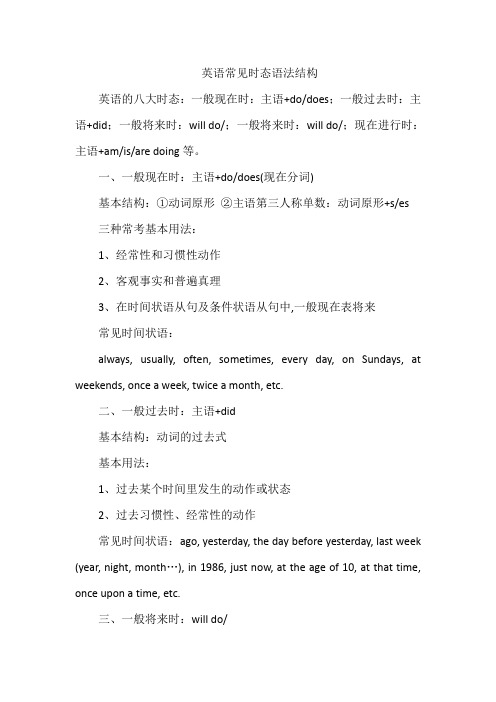
英语常见时态语法结构英语的八大时态:一般现在时:主语+do/does;一般过去时:主语+did;一般将来时:will do/;一般将来时:will do/;现在进行时:主语+am/is/are doing等。
一、一般现在时:主语+do/does(现在分词)基本结构:①动词原形②主语第三人称单数:动词原形+s/es三种常考基本用法:1、经常性和习惯性动作2、客观事实和普遍真理3、在时间状语从句及条件状语从句中,一般现在表将来常见时间状语:always, usually, often, sometimes, every day, on Sundays, at weekends, once a week, twice a month, etc.二、一般过去时:主语+did基本结构:动词的过去式基本用法:1、过去某个时间里发生的动作或状态2、过去习惯性、经常性的动作常见时间状语:ago, yesterday, the day before yesterday, last week (year, night, month…), in 1986, just now, at the age of 10, at that time, once upon a time, etc.三、一般将来时:will do/基本结构:①am/is/are/going to + do;②will/shall + do.基本用法:1、(人)计划打算做某事2、(事)即将发生will/shall do1、将来的动作和状态(相对较长远)2、礼貌询问、客气邀请3、意愿常见时间状语:tomorrow, next day (week, month, year…), soon, the day after tomorrow, in+时间段(格外注意),etc.四、现在进行时:主语+am/is/are doing基本结构:am/is/are+现在分词基本用法:1、此时此刻正在进行的动作2、现阶段正在进行的动作常见时间状语:now, at this time, these days, etc.五、过去进行时:was/were doing基本结构:was/were+现在分词基本用法:1、过去某时刻正在进行的动作2、过去某时段正在进行的动作常见时间状语:at this time yesterday, at that time或以when引导的谓语动词是一般过去时的时间状语等.六、过去将来时:was/were to /would do基本结构:①was/were/going to + do;②would/should + do.基本用法:从过去时间点看将来,常用于宾语从句中.常见时间状语:the next day (morning, year…), the following month (week…), etc.七、现在完成时:have/has done基本结构:have/has + 过去分词基本用法:1、过去发生的动作对现在造成的影响或结果2、过去已经开始,持续到现在的动作或状态常见时间状语:recently, lately, so far, up to now, since+时间点,for+时间段, in the past few years, etc.八、过去完成时:had done基本结构:had + 过去分词基本用法:以过去某个时间为标准,在此以前发生的动作或行为,即"过去的过去".常见时间状语:before, after, by the end of last year(month…),etc.。
总结英语9大时态(合集20篇)
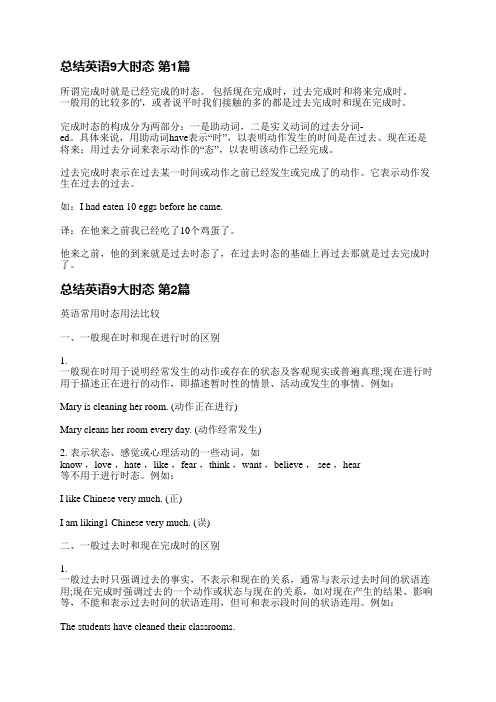
总结英语9大时态第1篇所谓完成时就是已经完成的时态。
包括现在完成时,过去完成时和将来完成时。
一般用的比较多的',或者说平时我们接触的多的都是过去完成时和现在完成时。
完成时态的构成分为两部分:一是助动词,二是实义动词的过去分词-ed。
具体来说,用助动词have表示“时”,以表明动作发生的时间是在过去、现在还是将来;用过去分词来表示动作的“态”,以表明该动作已经完成。
过去完成时表示在过去某一时间或动作之前已经发生或完成了的动作。
它表示动作发生在过去的过去。
如:I had eaten 10 eggs before he came.译:在他来之前我已经吃了10个鸡蛋了。
他来之前,他的到来就是过去时态了,在过去时态的基础上再过去那就是过去完成时了。
总结英语9大时态第2篇英语常用时态用法比较一、一般现在时和现在进行时的区别1.一般现在时用于说明经常发生的动作或存在的状态及客观现实或普遍真理;现在进行时用于描述正在进行的动作,即描述暂时性的情景、活动或发生的事情。
例如:Mary is cleaning her room. (动作正在进行)Mary cleans her room every day. (动作经常发生)2. 表示状态、感觉或心理活动的一些动词,如know ,love ,hate ,like ,fear ,think ,want ,believe , see ,hear等不用于进行时态。
例如:I like Chinese very much. (正)I am liking1 Chinese very much. (误)二、一般过去时和现在完成时的区别1.一般过去时只强调过去的事实,不表示和现在的关系,通常与表示过去时间的状语连用;现在完成时强调过去的一个动作或状态与现在的关系,如对现在产生的结果、影响等,不能和表示过去时间的状语连用,但可和表示段时间的状语连用。
例如:The students have cleaned their classrooms.(表示现在的教室是窗明洁净的)The students cleaned their classrooms yesterday. But it is dirty now.(表示昨天教室是干净的,现在又脏了)2. 现在完成时的谓语动词是瞬间动词时,不能跟表示段时间的状语连用。
英语八大时态讲解

英语八大时态讲解
英语的八大时态包括:一般现在时,一般过去时,现在进行时,过去进行时,一般将来时,过去将来时,现在完成时,过去完成时。
以下是每个时态的详细讲解:
一般现在时:表示经常性或习惯性动作,常与表频度的时间状语连用,如She often speaks English。
也可以表示现在的状态、特征、职业、能力、感觉等,如He seems to feel a bit down today。
此外,它还可以表示真理、客观存在、科学事实或用于格言警句中,如Shanghai lies in the east of China。
一般过去时:表示发生在过去的动作或存在的状态,通常与表示过去的时间状语yesterday,last night,some years ago,in 1990等连用。
现在进行时:表示正在进行的动作或存在的状态,如I am studying now。
过去进行时:表示在过去某个时间点正在进行的动作或存在的状态,如She was studying at 8 o’clock yesterday。
一般将来时:表示将来要发生的动作或存在的状态,如I will go to school tomorrow。
过去将来时:表示在过去某个时间点看来将要发生的动作或存在的状态,如She said she would come to see me the next day。
现在完成时:表示过去发生的动作持续到现在,并可能继续下去,如I have studied English for 5 years。
过去完成时:表示在过去某个时间点之前已经完成的动作或存在的状态,如He said he had finished his homework。
成人学位英语常考语法总结

成⼈学位英语常考语法总结第⼀节动词的时态考试重点:⼀般现在时(i f 从句和a s s oo n as从句);进⾏时表将来;现在完成时和现在完成进⾏时的区别;完成时瞬间动词以及ha v e (ha s)b e en, ha v e(ha s)go n e的区别;过去完成时的时间状语;将来完成时。
⼀、⼀般现在式:1、表⽰经常发⽣的动作或存在的状态:常和a l w ays, u s u al l y, o ft e n ,s o m et i m e s,e v e r y d a y,e v e r y w e e k的等时间状语连⽤。
例:H e go es t o wo r k ev e r y d a y.他每天去上班。
2、表⽰普遍的真理。
由于是众所周知的客观事实,所以⼀般不⽤时间状语。
例:Th e e a rt h i s ro un d. 地球是圆的。
3、有些表⽰⼼理状态或感情的动词往往⽤⼀般现在时。
例:I d o n’t t hi nk yo u a r e ri ght.我以为你错了。
4、在时间、条件状语从句中表⽰将来的动作:常⽤的连词有a s s oon as,w h en,t i l l,i f。
(1)Th e y w i l l go h om e f or w i nt er vo c at i on as s o on as t h e y ________t h ei r ex am s.A. h a v e fi ni s he dB. fi ni shC. fi ni sh edD. w a s fi ni shi n g(答案:B)(1996年22题)(2)W h en t he m i x t u r e ______, i t wi l l gi v e o f f a p ow e r f ul f o r ce.A. w i l l h e atB. wi l l b e h ea t e dC. i s h e at edD. h a s he a t ed(答案:C)(1992年59题)⼆、⼀般过去时:1、表⽰过去的动作或状态:常和过去时间状语连⽤。
英语时态总结

英语时态总结一般现在时:主语+谓语(动词原形)+宾语例句:I play football现在进行时:主语+be动词+谓语(动词现在分词)+宾语例句:I am playing football一般过去时:主语+谓语(动词过去式)+宾语+其他例句:I played football yesterday时态是英语学习中一个至关重要的内容,广大初中学生在实际运用时,往往对时态总是倍感棘手,下面我们就归纳复习一下这几种时态。
一、一般现在时:概念:经常、反复发生的动作或行为及现在的某种状况。
时间状语:always, usually, often, sometimes, every week (day, year, month…), once a week,on Sundays, etc.基本结构:①be动词;②行为动词否定形式:①am/is/are+not;②此时态的谓语动词若为行为动词,则在其前加don't,如主语为第三人称单数,则用doesn't,同时还原行为动词。
一般疑问句:①把be动词放于句首;②用助动词do提问,如主语为第三人称单数,则用does,同时,还原行为动词。
例句:The students study very hard. 学生们学习很认真。
She has a dictionary. 她有一本字典。
二、一般过去时:概念:过去某个时间里发生的动作或状态;过去习惯性、经常性的动作、行为。
时间状语:ago, yesterday, the day before yesterday, last week(year, night, month…), in 1989, just now, at the age of 5, one day, long long ago, once upon a time, etc.基本结构:①be动词;②行为动词否定形式:①was/were+not;②在行为动词前加didn't,同时还原行为动词。
英语9大时态结构

英语9大时态结构1. 简单现在时(Simple Present Tense):例子: She works in a hospital.她在一家医院工作。
2. 现在进行时(Present Continuous Tense):例子: They are playing football in the park.他们正在公园踢足球。
3. 现在完成时(Present Perfect Tense):例子: I have finished my homework.我已经完成了我的作业。
4. 现在完成进行时(Present Perfect Continuous Tense):例子: He has been studying English for two hours.他已经学习英语两个小时了。
5. 简单过去时(Simple Past Tense):例子: She visited her grandmother last weekend.她上周末去看望了她的奶奶。
6. 过去进行时(Past Continuous Tense):例子: They were watching a movie when I called them.当我打电话给他们时,他们正在看电影。
7. 过去完成时(Past Perfect Tense):例子: By the time I arrived, they had already left.当我到达时,他们已经离开了。
8. 过去完成进行时(Past Perfect Continuous Tense):例子: She had been waiting for the bus for an hour when it finally arrived.当公交车终于到达时,她已经等了一个小时了。
9. 将来时(Future Tense):例子: They will go on a trip next week.他们下周将去旅行。
成人高考英语必备知识点
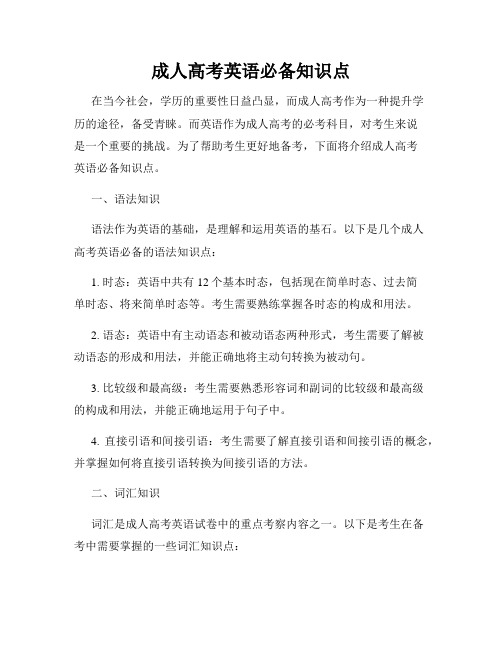
成人高考英语必备知识点在当今社会,学历的重要性日益凸显,而成人高考作为一种提升学历的途径,备受青睐。
而英语作为成人高考的必考科目,对考生来说是一个重要的挑战。
为了帮助考生更好地备考,下面将介绍成人高考英语必备知识点。
一、语法知识语法作为英语的基础,是理解和运用英语的基石。
以下是几个成人高考英语必备的语法知识点:1. 时态:英语中共有12个基本时态,包括现在简单时态、过去简单时态、将来简单时态等。
考生需要熟练掌握各时态的构成和用法。
2. 语态:英语中有主动语态和被动语态两种形式,考生需要了解被动语态的形成和用法,并能正确地将主动句转换为被动句。
3. 比较级和最高级:考生需要熟悉形容词和副词的比较级和最高级的构成和用法,并能正确地运用于句子中。
4. 直接引语和间接引语:考生需要了解直接引语和间接引语的概念,并掌握如何将直接引语转换为间接引语的方法。
二、词汇知识词汇是成人高考英语试卷中的重点考察内容之一。
以下是考生在备考中需要掌握的一些词汇知识点:1. 同义词和反义词:考生需要学习一些常用的同义词和反义词,以扩充自己的词汇量,并能够理解和运用这些词汇。
2. 词根和词缀:考生需要掌握一些常用的词根和词缀,以便能够通过词根和词缀的含义来推测和理解生词的意思。
3. 习惯用语和常用短语:考生需要熟悉一些常用的习惯用语和常用短语,以便在写作和阅读中能够正确地运用它们。
三、阅读理解技巧阅读理解是成人高考英语试卷中的一项重要部分。
以下是考生在备考中需要掌握的几种阅读理解技巧:1. 题目顺序阅读法:考生可以先阅读问题,然后根据问题的内容有针对性地阅读文章,以便更快地找到答案。
2. 同义替换词法:考生在阅读文章时,有时会遇到一些与问题中所问的词汇相同或相近的词汇,但表达方式不同,考生需要能够准确地识别出这些替换词。
3. 精读与略读结合法:对于篇幅较长的文章,考生可以先快速浏览一遍,了解文章的大意和结构,然后再进行精读,以找到问题的答案。
【整理】英语16种时态表

【整理】英语16种时态表一、一般现在时一般现在时表示经常发生或习惯性的动作、状态或真理。
其结构为:主语 + 动词原形(第三人称单数加s/es)。
例句:He goes to school bike every day.(他每天骑自行车上学。
)二、一般过去时一般过去时表示过去某个时间发生的动作或存在的状态。
其结构为:主语 + 动词过去式。
例句:I visited the Great Wall last year.(去年我参观了长城。
)三、一般将来时一般将来时表示将来某个时间会发生的动作或存在的状态。
其结构为:will + 动词原形。
例句:She will graduate from college next year.(她明年将大学毕业。
)四、现在进行时现在进行时表示正在进行的动作或状态。
其结构为:主语 + be动词(am/is/are) + 现在分词。
例句:They are watching a movie in the cinema.(他们正在电影院看电影。
)五、过去进行时过去进行时表示在过去某个时间正在进行的动作或状态。
其结构为:主语 + was/were + 现在分词。
例句:She was reading a book when I called her.(我给她打电话时,她正在看书。
)六、将来进行时将来进行时表示将来某个时间正在进行的动作或状态。
其结构为:will be + 现在分词。
例句:In two hours, we will be sitting in the classroom.(两小时后,我们将坐在教室里。
)七、现在完成时现在完成时表示过去发生的动作对现在造成的影响或结果,常与时间状语since, for, already, yet等连用。
其结构为:主语 +have/has + 过去分词。
例句:She has already finished her homework.(她已经完成了她的家庭作业。
英语的九种时态结构表

英语的九种时态结构表英语的九种时态结构表如下:1. 一般现在时(Simple Present Tense)- 肯定句:主语+ 动词原形- 否定句:主语+ do not/does not + 动词原形- 疑问句:Do/Does + 主语+ 动词原形?2. 一般过去时(Simple Past Tense)- 肯定句:主语+ 动词过去式- 否定句:主语+ did not + 动词原形- 疑问句:Did + 主语+ 动词原形?3. 一般将来时(Simple Future Tense)- 肯定句:主语+ will + 动词原形- 否定句:主语+ will not/won't + 动词原形- 疑问句:Will + 主语+ 动词原形?4. 现在进行时(Present Continuous Tense)- 肯定句:主语+ am/is/are + 动词现在分词- 否定句:主语+ am not/is not/are not + 动词现在分词- 疑问句:Am/Is/Are + 主语+ 动词现在分词?5. 过去进行时(Past Continuous Tense)- 肯定句:主语+ was/were + 动词现在分词- 否定句:主语+ was not/were not + 动词现在分词- 疑问句:Was/Were + 主语+ 动词现在分词?6. 现在完成时(Present Perfect Tense)- 肯定句:主语+ have/has + 动词过去分词- 否定句:主语+ have not/has not + 动词过去分词- 疑问句:Have/Has + 主语+ 动词过去分词?7. 过去完成时(Past Perfect Tense)- 肯定句:主语+ had + 动词过去分词- 否定句:主语+ had not + 动词过去分词- 疑问句:Had + 主语+ 动词过去分词?8. 现在完成进行时(Present Perfect Continuous Tense)- 肯定句:主语+ have/has been + 动词现在分词- 否定句:主语+ have not/has not been + 动词现在分词- 疑问句:Have/Has + 主语+ been + 动词现在分词?9. 将来完成时(Future Perfect Tense)- 肯定句:主语+ will have + 动词过去分词- 否定句:主语+ will not have + 动词过去分词- 疑问句:Will + 主语+ have + 动词过去分词?。
成人高考英语动词时态

(4)在时间状语从句(when, after, before, while, until, as soon as等)和 条件状语从句(if, unless)中使用,用一般现在时代替一般将来时。
Please send text message to me when you arrive in China.
动词时态
时态考点
1、考查在语境中判断动词时态的运用能力。常考的时态为:一 般现在、一般过去、一般将来、现在进 行、过去进行、现在完 成、过去完成、现在完成进行、过去将来等。 2、时间、条件、让步等状语从句中动词的时态;主从句时态呼 应问题。 3、几种时态的替代问题.
语态
时态 一般现在时 一般过去时 一般将来时 过去将来时 过去完成时 现在完成时 将来完成时 现在进行时 过去进行时
(2)用will表示将来,动作与人的主观愿意无关。
Lily will stay in Guangzhou for three day. 丽丽将会在广州住三天。
(3)用am, are, is going to do"表示打算或者准备要做某事,用am, are, is
- 1、下载文档前请自行甄别文档内容的完整性,平台不提供额外的编辑、内容补充、找答案等附加服务。
- 2、"仅部分预览"的文档,不可在线预览部分如存在完整性等问题,可反馈申请退款(可完整预览的文档不适用该条件!)。
- 3、如文档侵犯您的权益,请联系客服反馈,我们会尽快为您处理(人工客服工作时间:9:00-18:30)。
常与连词:when , as soon as , before , after , until , if 如果,等引导的 时间状语或条件状语从句
(2)表示现在的动作或状态 there are many visitors in the Zoo。 在动物园里有很多客人。 Here comes the bus. 公车来了。
(3)表示客观事实或普遍用法
The sun rises in the east. Light goes faster than sound The earth moves around the sun.
(1)表示经常发生或习惯性的动作或状态
We often write to each other.
David often sleeps during class. My parents take excrcise in the park every morning .
常与always,usually,often,sometimes,every day,once a week,yearly 每年,monthly每月, 等时间状语或频率副词连用。
6. She _i_s_n_’__t_p_l_a_y_in_g(not play) the guitar at the moment.
7. What _d_o_e_s__his father usually __d__o___(do) in the evening ?
8. Theya_r_e__g_o_in_g__t_o_h_a_v_e( have ) a meeting next week, aren't they? 9. Both he and I __a_r_e____ (be) teachers.
2)be +不定式表将来,按计划或正式安排将 发生的事。 We are to discuss the report next Saturday.
3)be about to +不定式,意为马上做某事。 He is about to leave for Beijing.
1. Peter __p_la_y_s___ (play) basketball twice a week. 2. Do you believe what he __s_a_i_d___ (say) just now?
Practise
3. Look! The lazy cat _i_s_s_l_e_e_p_in_g___ (sleep) in the sofa.
4. There __i_s____(be) a book and two pens on the desk.
5. _A_r_e__you _g_o_i_n_g_t_o__s_e_e____(see ) a film tomorrow morning?
Will(将要)---will +原型动词 表示纯粹的未来
We will leave school soon. I will not change my mind . 我不会改变主意。/ I’ll not /I won’t I will be 20 years old next year. 我明年将20岁了。( 不能用am going to ) A:I can’t move this large box . B:I’ll do it for you .我会帮你做。
常用的9种时态:
一般
进行
完成现在Βιβλιοθήκη workam/is/are working have/has worked
过去
worked
was/were working had worked
将来
will work
will be working will have worked
1.一般现在时 一般动词主语为第三人称的单数加S
10. I _d_i_d_n_’__t__f_e_e(lnot feel ) very well yesterday .
11. He put on his coat and ___w_e_n_t___ (go) out. 12. Lei Feng often ___h_e_lp_s______ (help) others. 13. Next Sunday, we __a_r_e__g_o_in_g__t_o_c_l_e_a_n__ (clean) up the park. 14. Hurry! Your mother ___is__w_a_it_i_n_g__ (wait) for you at the gate.
3)wish, wonder, think, hope 等用过去时,作试探性的 询问、请求、建议等。 I thought you might have some.
3一般将来时
1)be going to +不定式,表示将来。
表示用于实现性非常高的事或事先计划好的未来。 Tomorrow , morning afternoon evening, the day after tomorrow . Next week /year , in+时间--In a few day (几天后) in a week ( 在一星期之后) What are you going to do tomorrow? I’m going to visit my uncle tomorrow . I have to buy the ladder because I’m going to paint the house . I don’t feel good .I’m afraid that I’m going to be sick. 恐怕要感冒了。 Are they going to have a party on christmas Eve?
2一般过去时 一般动词过去式动词不分人称加 ed
1)在确定的过去时间里所发生的动作或存在的状态。 时间状语有:yesterday, last week, an hour ago等。 Where did you go just now?
2)表示在过去一段时间内,经常性或习惯性的动作。 When I was a child, I often played football in the street.
